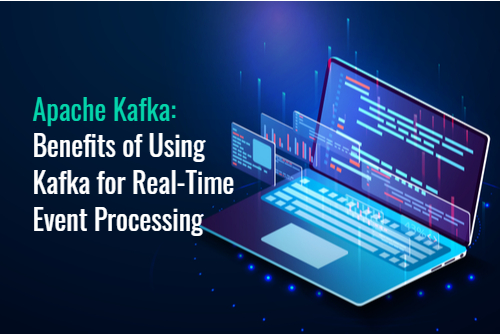2025-05-23
Powering Healthcare Innovation: AI at the Core of Patient Care and Operational Excellence
06 August, 2021
Technology

Most businesses recurrently collect their core data rather than wait for the data to accumulate. It's a round-the-clock event that requires continuous and real-time processing and analyzing.
For this reason, real-time event processing is critical for any organization. This is because it empowers enterprises to derive meaningful patterns from the real-time flow of business events. By detecting event patterns, businesses can aptly react to the patterns and identify risks and opportunities.
Apache Kafka has emerged as one of the most popular real-time data streaming and processing platforms for organizations.
As a result, more and more brands are incorporating Apache Kafka for real-time event processing into their operations to better their products and differentiate their brand.
In fact, more than 80% of all Fortune 100 companies trust and use Kafka services. These include companies like Uber, Twitter, Airbnb, Yelp, and more. Of course, they likely wouldn't be using Apache Kafka at all if it wasn't improving their real-time processing.
So, how does Kafka help with real-time processing, and why should your company want in? Read on to find out the business benefits of using Kafka for real-time event processing.
A slight delay in the reaction time to a significant business event can adversely affect organizational success for businesses.
Imagine your applications having glitches causing customer problems when using your app. Terrible, right?
If a user consistently struggles with your app or any other business process event, they will abandon your offerings.
Kafka solves this issue by creating a data-driven environment that significantly reduces the time elapsed between when an event is recorded to when the system and data application react to it. You can also generate analysis within live streams of data over a defined time frame.
Your organization can rapidly use data-driven analytics and insights to solve and improve products, services, and business outcomes.
Analyzing current and older data logs has a significant impact on attaining and retaining users. However, it can be both a laborious and expensive process with no guarantee of success.
Kafka improves your chances of success by helping your business intelligently filter through numerous records from log data sources to look for irregularities or other business-critical variations. This ensures that every log event is analyzed and any relevant changes are correctly executed and promptly.
Kafka gives your software the ability to take in data rapidly and reliably move the data between different applications. It also allows for flexibility.
An even bigger benefit is that Kafka supports even the most complex data integration scenarios.
For instance, organizations with loosely connected IT systems can easily communicate with Kafka. Moreover, if your applications support full event tracking and coverage, all events can be streamed and logged into your database, enhancing real business value.
With Kafka, you can also establish a single source of truth (SSOT) structure to ensure that everyone in your organization bases business decisions on similar data.
Micro services integration is critical in creating a seamless experience in your system, especially from the end user's standpoint.
However, creating a micro services architecture is a process plagued by different integration challenges.
For example, leveraging multiple implementation technologies that are physically separated by networks and require seamless communication is a common micro services integration challenge.
Such systems require proper integration for successful results. Properly integrated systems help realize the process inputs of other distributed systems by enabling scaling at the service level, improving efficiencies, and potentially reducing infrastructure costs.
Contrastingly, wrongly integrated systems dent the business benefits of your micro services architecture. We're talking about painful data loss and integrity issues. Worse, such issues are usually tough to identify and adversely impact your users all along.
Kafka comes in handy to help facilitate seamless micro service integration by ensuring you fly through common micro service integration challenges.
As your organization moves to event-driven micro service architectures, so do your applications become agile.
Agile methodologies encourage your developers to break down software development into small tasks hence providing quicker feedback loops and ensuring that your product aligns with user needs.
Leveraging Agile methodologies along with Kafka's real-time event processing helps effectively spread your processing load to increase scalability.
Additionally, it reduces dependencies and complexity to help increase code maintainability and reliability across your pipeline.
And with lots of cutting-edge technologies built around Kafka's real-time event processing, businesses that are early adopters of Apache Kafka stand to benefit more.
The business climate today has forced organizations to shift from state-oriented applications and services to stream-oriented applications.
Despite that, organizations are still required to maintain a high level of quality products and improve their applications.
You don't have to be a Fortune 100 company to be a Kafka leader. Companies large and small, old and young, have all transitioned to Kafka's real-time event processing and have the proof of success in their pockets.
At Pronix, we help all organizations leverage the power of Apache Kafka to tackle real-time event processing for high-performance data pipelines, streaming analytics, data integration, and business-critical applications.
We can help you adopt Kafka to grow your capabilities and scale your business.
Talk to our and Apache Kafka experts today and get a free quote.
Latest Posts
OUR BLOG
© 2025 Pronix inc. All Rights Reserved